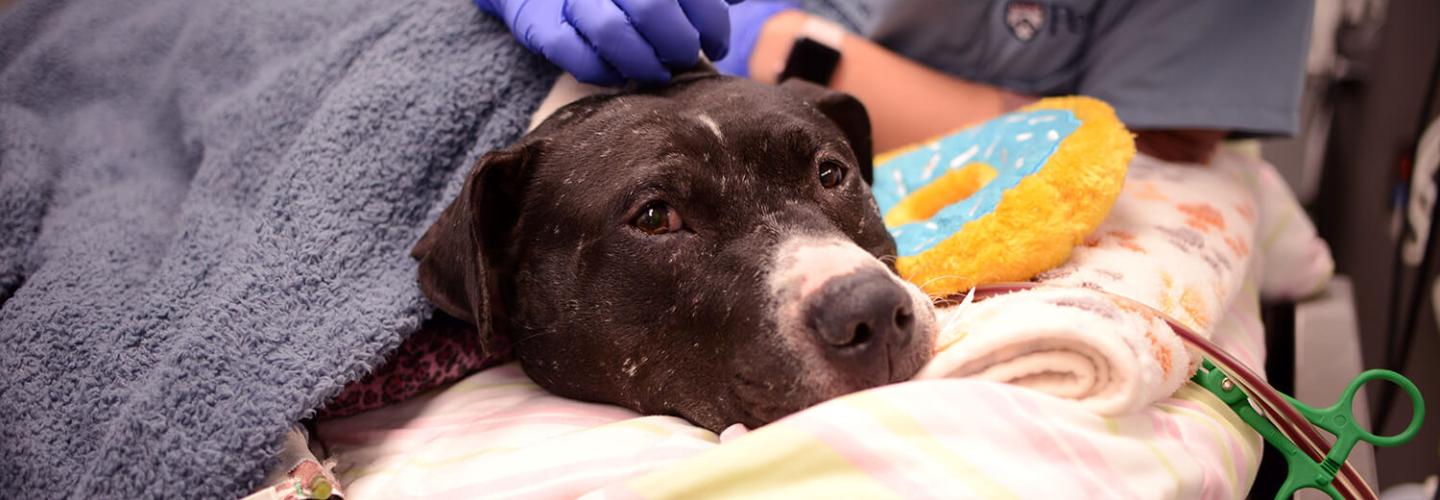
Extracorporeal Therapies
What we do
Extracorporeal Therapies offers your pet a variety of life saving procedures that can help remove harmful substances from the blood. These procedures include kidney replacement therapies such as hemodialysis, ultrafiltration, hemoperfusion, plasma adsorption, therapeutic plasma exchange, and cell collection therapies. The doctors at Penn Vet are board certified in emergency and critical care medicine and have advanced training and expertise in extracorporeal therapies and nephrology and work with and within the Advanced Urinary Care service providing comprehensive care to your pet. Our dedicated nurse is specifically trained in providing extracorporeal therapy ensuring that your pet’s treatment is safe and comfortable.
Our Services
Equipment and Treatment
We care for our patients with the following equipment, two hemodialysis machines, one continuous kidney replacement machine, one apheresis machine, and one hemoperfusion pump. We meet AAMI water standards and test for heavy metals and bacteria to ensure safety. We are also one of the few hospitals to offer the ability to help infants and small pets, using the the CarpediemTM Cardio-Renal Pediatric Dialysis Emergency Machine. This equipment allows us to improve the health your pet.
Hemodialysis
The hemodialysis machine acts as an artificial kidney to process blood and remove toxins and excess water. Hemodialysis may be recommended for many diseases including treatment of acute kidney injury, toxin ingestion, or prior to surgical treatment for kidney disease.
Hemodialysis and Kidneys
- Hemodialysis helps remove the wastes and toxins that build up in the body when the kidneys are unable to do their job.
- Hemodialysis does not treat an injury to the kidney.
- Hemodialysis helps patients to feel better while the kidneys rest and recover.
We will recommend additional treatments during hospitalization to treat the underlying kidney disease. These treatments will vary, but will include nutritional management, pain management, and disease specific recommendations.
Hemoperfusion and plasma adsorption
Using a specialized filter, this treatment removes substances from the blood or plasma such as toxins, cytokines and pathogens. It can be provided alone or in combination with hemodialysis or therapeutic plasma exchange.
Therapeutic Plasma Exchange
Therapeutic Plasma Exchange (TPE) utilizes a machine that separates blood into red blood cells and plasma. TPE may be recommended for specific intoxications or to treat immune mediated diseases. During the treatment, the plasma containing toxins or antibodies is removed and replaced with fresh plasma.
Treatments
The exact number of treatments required depend on the cause and severity of the underlying disease. For many intoxications, only a single treatment is necessary. These patients may even be able to go home the next day. In patients with acute kidney injury or immune mediated disease, multiple treatments are necessary over a period of days. During this time, animals stay with us in the hospital and additional therapies will be initiated to help treat the underlying disease. At the time of consultation, we will make a recommendation for the initial number of treatments to expect for your pet.
What Happens During a Treatment
Treatments are not painful and do not require anesthesia. Prior to the first treatment, a large catheter will be placed. This will require sedation or, in some cases, a short anesthesia. During the treatment, we provide a soft and warm bed. We keep the lights turned down in the room to make therapy as relaxing as possible. Many animals even take a nap during their treatment. We monitor heart rate, breathing rate, and temperature regularly. Each treatment lasts between 3-6 hours. Over time, our patients begin to associate the dialysis room with feeling better and look forward to coming in to see us!
Ultrafiltration
The purpose of ultrafiltration is to remove excess fluid from the body that may accumulate due to kidney injury or from congestive heart failure resulting in fluid overload.
Cell Collection Therapy
This procedure utilizes a machine in which the blood is separated into its major components red blood cells, platelets, white blood cells and plasma. We can then collect specific cells such as lymphocytes and granulocytes that may be used in immunotherapy treatments for patients with cancer or other autoimmune diseases.
Costs
Costs vary, depending on the reason for treatment and duration of therapy. We will give you an estimate of the cost of care during the initial consultation. If you think your pet could benefit from Extracorporeal therapy, have your vet contact us at pennvet.ect@vet.upenn.edu or call our Emergency Service. We will work together to create a plan for your pet’s care and possible referral.
Our Care Team
We work with your regular veterinarian, the Penn Vet team of veterinarians, and our highly trained veterinary technicians. Learn more about the Extracorporeal team and service.
Veterinarians
About the Section
Emergency, Critical Care, and Extracorporeal Therapy
The Emergency, Critical Care (ICU), and Extracorporeal Therapy services at Ryan Hospital work together to provide an unsurpassed level of care that ensures your pet has the best chance of recovery from life-threatening diseases or situations.
The veterinarians, residents, interns, and nursing staff work in a team-oriented environment to provide the best possible care. Explore each of these services below for more information.
Research in Advanced Urinary Care
Our clinical research team within Penn Vet’s Advanced Urinary Care service includes translational immunologists, transplant immunologists and surgeons, and extracorporeal therapy criticalists who are exploring the adoptive transfer of immune regulatory cell types such as regulatory T cells (Tregs) and iNKT cells to promote immune tolerance.
Our goal is to apply our combined expertise to develop canine immune regulatory cellular therapies that can be used either alone or in combination with other immunomodulatory platforms to enable successful allogeneic renal transfer in canines with chronic renal failure.
Transplantation Immunology within Advanced Urinary Care
Rejection of major histocompatibility unmatched, allogeneic tissues and cells are a significant barrier to successful organ transplant and off-the-shelf, genetically engineered adoptive T cell therapies. Overcoming this barrier by exploiting the beneficial effects of immune regulatory cell would enable more patients to receive life-saving organ transplants or adoptive T cell therapies that have the potential to cure patients with hematological and solid cancers.
Our clinical research team within Penn Vet’s Advanced Urinary Care service includes translational immunologists, transplant immunologists and surgeons, and extracorporeal therapy criticalists who are exploring the adoptive transfer of immune regulatory cell types such as regulatory T cells (Tregs) and iNKT cells to promote immune tolerance.
Our group has significant expertise in transplant immunology and renal transplant surgery and in the generation and use of adoptive cellular therapies in canine cancer patients.
Our goal is to apply our combined expertise to develop canine immune regulatory cellular therapies that can be used either alone or in combination with other immunomodulatory platforms to enable successful allogeneic renal transfer in canines with chronic renal failure.
Ryan Veterinary Hospital
Emergencies:
(215) 746-8911
By Appointment:
(215) 746-8387



